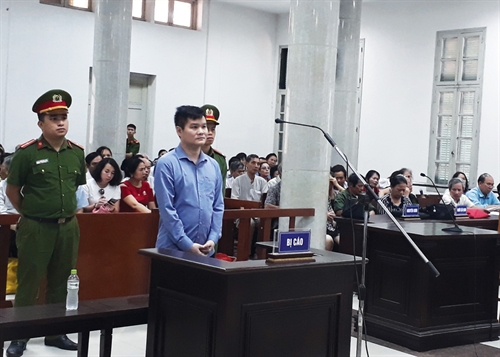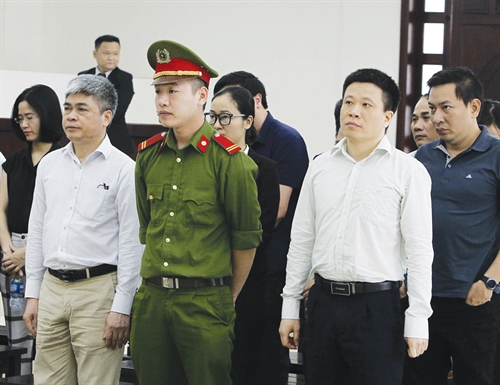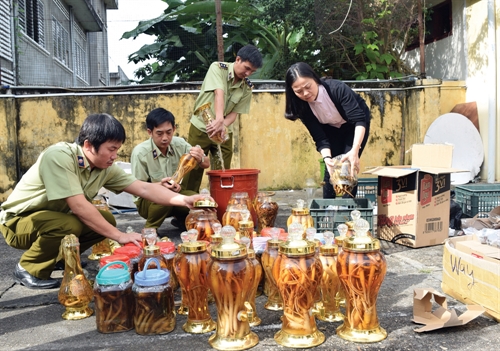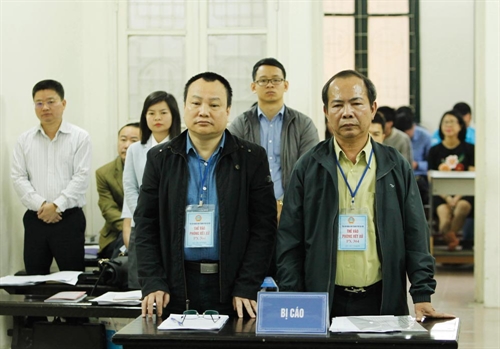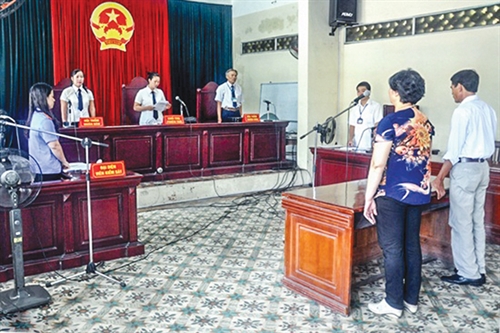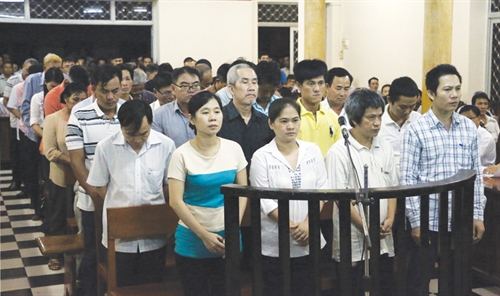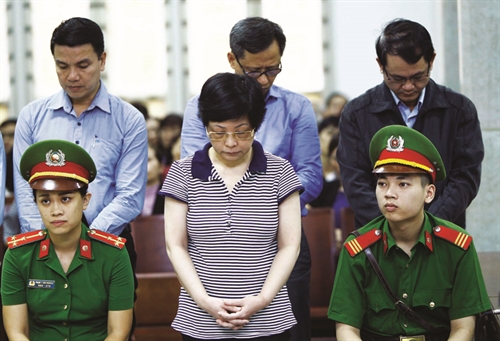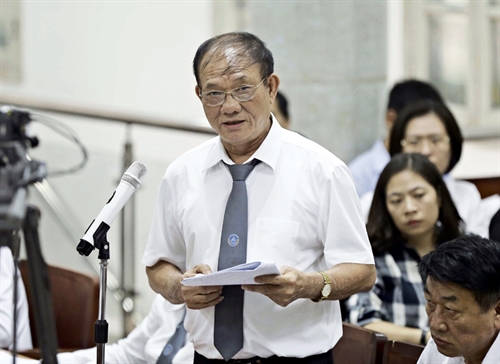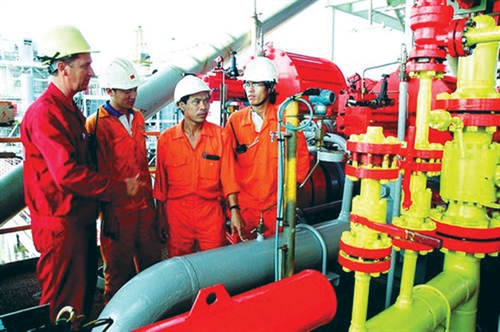Nguyen Huu Hoai, Partner, Russin & Vecchi
On June 20, 2017, the National Assembly passed the revised Penal Code (new Penal Code). It became effective on January 1, 2018. Several significant changes have occurred. Several acts, previously criminal, are no longer punishable. On the other hand, several previously innocent acts have been criminalized. One very large change is that an enterprise-not just an individual-may now be guilty of a crime1.
This article is intended to raise the awareness of corporate officials and white collar workers. It discusses several new provisions that relate to: (i) brokering, giving or receiving a bribe; (ii) failure to contribute social, health, unemployment insurance (SHUI); (iii) illegal termination of employment; (iv) corporate liability; and (v) removal and addition of several economic offenses.
Brokering, giving or receiving a bribe
Previously, if brokering, giving or receiving a bribe or a commission, involved a non-state entity, the act was merely an employment matter. It was not a criminal act. That is, non-state entities were not able to take legal action against their employees for such conduct. The situation has changed. The following conduct is now punishable under the new Penal Code.
(a) a manager, employee, salesperson of a company who gives or offers to give a bribe of VND 2,000,000 or more (whether directly or via an intermediary) to a potential customer in exchange for business, is accountable (Art. 364);
(b) a person who brokers a bribe of VND 2,000,000 or more is subject to criminal charges (Art. 365);
(c) an officer of a company is subject to criminal charges if he receives or takes steps to receive a bribe of VND 2,000,000 or more (whether directly or via an intermediary) in order to take or forebear from taking action in favor of the giver or at the giver’s request (Art. 354);
(d) a person who is aware of any case set out in (a), (b) or (c) above, which involves an amount of VND 500,000,000 or more, or multiple violations, etc., and who fails to report the matter to the police, is subject to criminal liability (Art. 390); and
(e) a person who is coerced to give a bribe is not criminally accountable if he discloses the matter to the police before the act is detected. In case of proactive disclosure, he is entitled to the return of amounts which he has paid to the recipient (Art. 364). This provision is intended to encourage a giver to report coerced payments.
Corporations should consider measures to take the new realities into account. For example:
• A serious, open commitment against corruption and bribery by senior management;
• A comprehensive code of business conduct and internal labor regulations which are effective tools to mitigate exposure;
• Regular training, internal audit and risk assessment to help establish rules and a proper culture;
• An investigation may be required in certain circumstances.
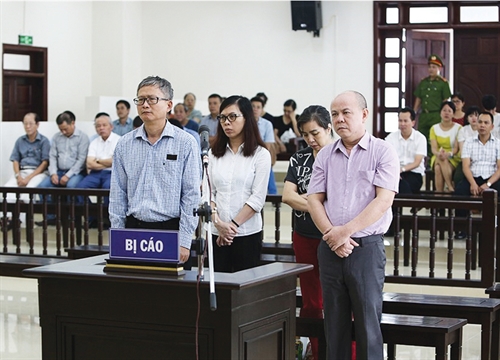 |
| On Jun 8, Hanoi-based Superior People’s Court pronounces an appellate judgment to Dinh Manh Thang, Thai Kieu Huong, Nguyen Thi Kim Thoa and Huynh Nguyen Quoc Duy for their crime of embezzling property of PVP Land Joint-Stock Company__Photo: Duong Giang/VNA |
Criminal liability for evasion of SHUI
For the first time the law now imposes criminal liability for the evasion of SHUI. Particularly, a person who is responsible to pay SHUI and who fails to do so (with a value of VND 50,000,000 or more) or who fails to contribute SHUI for 10 or more employees is subject to criminal liability. This provision protects employees and fixes liability on the company’s legal representative. Criminal liability for the evasion of SHUI also applies to the employer. To avoid criminal exposure, a company must carefully review its SHUI contributions in the same way that it pays attention to its tax compliance.
Illegal termination of employment
The new Penal Code provides another protection for employees. A person who terminates an employee illegally or who issues a decision of dismissal of a public official/servant or who forces or threatens to force a public official/servant or employee to terminate employment for a self-seeking purpose, causing “serious consequences”, may be subject to criminal liability. The concept of “serious consequences” was used in the old penal code, and it has been elaborated upon in Supreme Court resolutions. Generally, it means consequences such as death, injury involving several people or a serious injury that is greater than the injury level set out in the Supreme Court’s guidance, or damages suffered by a pregnant woman, etc. This guidance still applies in the new Penal Code. However, there is no separate guidance on the concept of “serious consequences” used in this particular new provision. This matter may be elaborated upon by the Supreme Court in new resolutions.
Corporate liability
In the past, only natural persons were held for criminal liability.
The new Penal Code introduces a new concept whereby a commercial legal entity (eg. a company, partnership, etc.) may also be liable for several offenses such as counterfeiting, insider trading, infringement of intellectual property, tax evasion, SHUI evasion, and much more (about 30 offenses). See the list of corporate criminal acts in footnote (1).
If a commercial legal entity commits an offense, it may face one of the following penalties:
• monetary fine;
• either temporary or permanent suspension of business operation;
• prohibition to operate in certain business areas;
• prohibition to raise capital.
Conviction of a commercial legal entity for a criminal act does not override the personal liability of any person involved in the offense.
Removal and addition of economic offenses
In the past, failure to register a business activity or to conduct business without an appropriate license was considered criminal. This is no longer so. Decriminalization of such acts has been welcomed, particularly by the start-up community.
A number of offenses that are not deemed to be harmful to society have also been abolished:
(i) distribution of dividends by using additional surplus of the charter capital of a credit institution;
(ii) providing incorrect data and untrue documents that cause serious consequences in the establishment and implementation of socio-economic plans of the Government; and
(iii) offenses which involve a violation of rules governing issuance of an industrial property protection title.
Frankly, these are marginal activities.
In parallel with the decriminalization of certain activities, conduct involving certain commercial matters has been criminalized. They are:
(i) forging documents in order to make, list securities;
(ii) insurance fraud;
(iii) SHUI fraud;
(iv) SHUI evasion;
(v) offenses involving a breach against regulations on competition;
(vi) offenses involving a breach against regulations on asset auction;
(vii) breach of regulations on use and management of state property which causes loss and leakage;
(viii) breach of regulations on use and management of public investment capital causing serious consequences;
(ix) breach of regulations on accounting affairs causing serious consequences;
(x) breach of regulations on bidding which causes serious consequences;
(xi) abuse of power and authority to connive and protect taxpayers which cause serious consequences;
(xii) breach of regulations on investment and development of construction work which causes serious consequences;
(xiii) breach of regulations on compensation, support and resettlement in respect of land recovered by the State; and
(xiv) breach of regulations on management of wild animals.
The new provisions have not been tested nor elaborated upon. The Supreme Court is expected to issue guidance soon but the basic new rules are now set out. Companies should review the newly regulated areas and then look at their existing practices and compliance programs.-
| LIST OF CRIMINAL ACTS FOR WHICH A COMPANY IS NOW LIABLE (a) Smuggling; (b) Illegal transport of goods or money across the border; (c) Manufacturing and trading of banned goods; (d) Possession and transport of banned goods; (e) Manufacturing and trading of counterfeit goods; (f) Manufacturing and trading of counterfeit food or food additives; (g) Manufacturing and trading of counterfeit medicines for treatment or prevention of diseases; (h) Manufacturing and trading of counterfeit animal feeds, fertilizers, veterinary drugs, pesticides, plant varieties, animal breeds; (i) Speculation; (j) Tax evasion; (k) Printing, issuing, dealing in illegal invoices and receipts for payment of state revenues; (l) Provision of false information or concealment of information in securities activities; (m) Use of internal information for trading securities; (n) Manipulation of securities market; (o) Insurance fraud; (p) Evading payment of social insurance, health insurance, unemployment insurance for employees; (q) Offenses involving a breach against regulations on the law on competition; (r) Infringement of copyright and related rights; (s) Infringement of industrial property rights; (t) Offenses involving a breach against regulations on survey, exploration and extraction of natural resources; (u) Offenses involving a breach against regulations on extraction and protection of forests and forest product management; (v) Offenses involving a breach against regulations on management and protection of wild animals; (w) Causing environmental pollution; (x) Offenses involving a breach against regulations on prevention, response and relief of environmental emergencies; (y) Offenses involving a breach against regulations on protection of irrigation works, embankments and disaster protection work, offenses against regulations on protection of river banks; (z) Bringing wastes into Vietnam’s territory; (aa) Destruction of aquatic resources; (bb) Destruction of forests; (cc) Offenses involving a breach against regulations on management and protection of endangered, rare animals; (dd) Offenses involving a breach against regulations on management of wildlife sanctuaries; (ee) Importing, spreading invasive species; (ff) Terrorism financing; and (gg) Violations involving a breach of regulations on conscription.- |
Court news
* The Government has recently vowed to support a scheme to build child-friendly trial rooms, said Chief Justice of the Supreme People’s Court Nguyen Hoa Binh at a session for deputies’ questions before the National Assembly on June 5.
Binh said such trial rooms would allow sexually assaulted children to attend behind-closed-doors hearings and enable them to be questioned via microphone devices so as to ensure their psychological stability.
The Supreme People’s Court has issued many documents providing professional guidance for over 6,000 judges to handle the crimes involving sexual assault against children and several circulars guiding the establishment of child-friendly and family tribunals and providing court precedents on these crimes. It has also finalized a draft legal document guiding Article 423 of the Criminal Procedure Code on the children-friendly proceeding steps in cases of sexual crimes against children for issuance in the coming time. A circular on transformation of special tribunals recently issued by the People’s Supreme Court requests local courts to establish special tribunals for marriage, family and minors whenever possible.
* In an effort to protect children from sexual assault or abuse, the Ministry of Public Security and Supreme People’s Procuracy in December 2017 worked with relevant ministries in issuing Joint Circular No. 01 on receipt of crime reports and denunciations and requests for initiation of criminal proceedings against crimes, especially those on child abuse, said Procurator General Le Minh Tri.
The Supreme People’s Procuracy is currently working with the Supreme People’s Court and Ministry of Public Security in finalizing a draft joint circular on the procedural order for initiation of criminal proceedings in cases involving under-18 persons. This draft will be issued in the third quarter of this year after obtaining opinions of the Judicial Council of the Supreme People’s Court. It is expected to create a legal ground for investigative bodies, procuracies and courts to perform their tasks in initiating criminal proceedings against these offenders.
* Minister of Public Security To Lam has recently also requested the establishment of a special investigation and trial process for sexual crimes against children. Articles 142 and 144 thru 147 of the 2015 Penal Code prescribe five sexual crimes against children, for which offenders may be sentenced to death if their crimes involve aggravating circumstances provided in Clause 3, Article 142 of the Code.-
